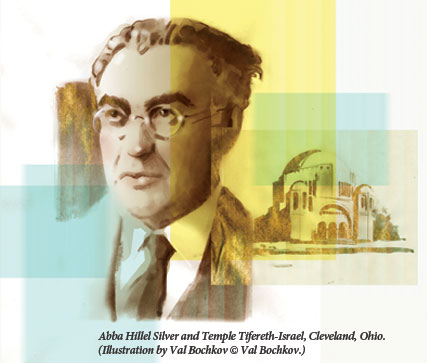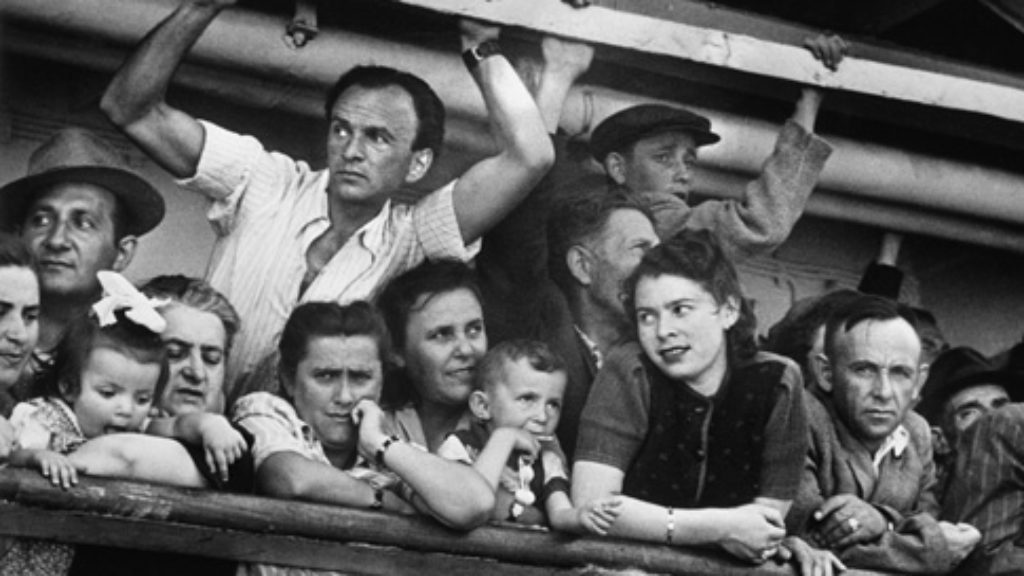What Is a Jew? The Answer of the Maccabees
“Who is a Jew?” David Ben-Gurion asked in a letter he dispatched to fifty Jewish leaders and thinkers around the world in 1958. He had good political reasons to launch such an inquiry, and equally good reasons to expect answers or attempts at answers. Isaiah Berlin wrote back, and so did the Jewish scholar Alexander Altmann, the novelist S.Y. Agnon, and the Lubavitcher Rebbe, as well as many others. But Abba Hillel Silver, the prominent Reform rabbi and American Zionist leader who had represented the Jewish Agency before the United Nations a decade earlier did not respond to Ben-Gurion’s missive—not directly, anyhow.
On December 7, 1958, the first day of Hanukkah, Silver explained to his Cleveland congregation, Temple Tifereth-Israel, why he did not think it was the business of the State of Israel, or any state for that matter, to formulate an answer to Ben-Gurion’s question. What really mattered, in his eyes, was not the legal definition of “Who is a Jew?” but rather a genuine understanding of “What is a Jew?” in both Israel and the diaspora. More than fifty years have passed since Silver delivered this sermon, but, as one scarcely needs to emphasize, it resonates deeply with our contemporary situation and retains all of its relevance.
The sermon was rediscovered by Professor Ofer Schiff of Ben-Gurion University, in the Abba Hillel Silver Archives at the Western Reserve Historical Society in Cleveland, Ohio. Schiff’s forthcoming book, Abba Hillel Silver: The Defeated Zionist (Resling), is scheduled to appear in 2012.
My dear friends, a heated debate has been going on in […] the State of Israel on “What is a Jew?” and “Who is Jew?” A cabinet crisis has developed within the government over this question. Ministers have resigned and the issue has spilled over the borders of Israel into the lands of the diaspora.
At first glance it appears to be sort of an academic question, and one which is asked rather late in the day—after thousands of years. […] Actually, to Israel it is a practical question, […] with the establishment of the state ten years ago, a law was enacted called “The Law of Return”—a law which permits every Jew from any part of the world to enter Israel and automatically to become a citizen of the State of Israel. […]
In this declaration “The Law of Return,” the term Jew is not defined. And as you know, hundreds of thousands have come to Israel in the last ten years from all parts of the world—the vast majority, of course, unquestionably Jews. On the other hand, there have been half-Jews and quarter-Jews who have come—children of mixed marriages who were not raised as Jews. Non-Jewish women who had married Jews in the diaspora but who had never been converted. Now, “The Law of Return” did not exclude any of them. But soon some problems began to develop—for example, there was the case of a Monk in a Catholic Monastery who acquired Israeli citizenship under legislation which grants automatic citizenship to all Jewish immigrants. This monk was an apostate—he had been a Jew—and by default he got away with his claim that by converting to Catholicism he had switched only his religious affiliation but had not relinquished his Jewish nationality. […] And there were quite a number of these cases—not of Monks of course, but similar cases which brought the question of “The Law of Return” into a focus whereby a clear definition had to be given as to who is a Jew.
And a more serious problem appeared here. As you know, the rabbinic court in Israel retains all authority in matters of marriage and divorce, and in all matters of personal status. […] These rabbinic courts follow, of course, rabbinic law and tradition in rendering their decisions. […] A Jew, according to rabbinic law, is a person born of a Jewish mother—irrespective of the father’s religion—or, of course, one who is born not a Jew, who was formally converted to the Jewish religion according to the prescribed ceremony of conversion […] Thus, for purposes of marriage and divorce, and all other situations involving personal status, the rabbinic courts, which have exclusive control over these matters, will not recognize as Jews all whom “The Law of Return” has accepted as Jews.
 And this situation came to a critical head this year when the Ministry of the Interior—now under the leadership of one who is not a deeply religious Jew […] asked all citizens of the State of Israel to fill out cards of identity and to indicate what religion they belonged to—Jewish, Christian, or Muslim. This was largely for matters of security […] the ministry stated that for the purposes of this registration it was sufficient for a man to declare in good faith that he is a Jew—and in the case of adults, that he does not belong to another religion […]
And this situation came to a critical head this year when the Ministry of the Interior—now under the leadership of one who is not a deeply religious Jew […] asked all citizens of the State of Israel to fill out cards of identity and to indicate what religion they belonged to—Jewish, Christian, or Muslim. This was largely for matters of security […] the ministry stated that for the purposes of this registration it was sufficient for a man to declare in good faith that he is a Jew—and in the case of adults, that he does not belong to another religion […]
Now, because of the wide-scale protest which developed in Israel over this matter, and because of the danger of a tragic rift in the Jewish community, the card had been temporarily suspended, and the government is now consulting with religious leaders—both in Israel and in the diaspora—as to how to handle the difficult problem and how to define, for the legal purposes of the state “Who is a Jew?”
Except for the fact that the government has turned over to the rabbinic court all matter of personal status […] the definition of “Who is a Jew?” would not be within the province of the state—and it is for the spiritual leaders throughout the world to decide this question; it is a religious question. The government of Israel can define only “Who is an Israeli?”—just as the government of the United States can decide “Who is an American?”—not who is a Christian or who is a Jew. This belongs to the leaders of the respective religious communities.
Now, I believe that sooner or later the Parliament of Israel, the Knesset, may have to interpret “The Law of Return” a little more closely, because of these problems which have arisen—although it is doubtful in my mind whether it will be able ever or willing ever to give a full and concise definition of the term “Jew.” If it gives any definition at all, it will be, in my judgment, a very liberal and commonsense view—not at all the rigid, traditional rabbinic view upon which the religious authorities in Israel insist. And as far as leaving all matters of personal status to the rabbinic court, which has given rise to these serious problems, I for one see no other solution for it than permitting civil courts to act in matters of marriage and divorce, which they do in the United States, for all such as do not wish to resort to rabbinic courts. This, I believe, will come in time, but only after a long and bitter conflict. A modern state cannot leave these basic questions of marriage and divorce to an ecclesiastical body.
But in Israel, this is an urgent legal question, which they are trying to solve. But for the Jewish people throughout the world, “Who is a Jew?” cannot be defined by the law of the land. In fact it requires no definition. It is not a legal question at all. A Jew is one who accepts the Jewish religion, who feels himself a Jew, who throws in his lot with the Jewish people, who wants to be identified with the Jewish community. It is a voluntary acceptance of historic commitments. […]
Now the Maccabees faced not a similar problem in their day, but a sort of related problem. Their problem was not “Who is a Jew?” but who is a true Jew and a loyal Jew—because there were many Jews in their day born Jews, racially Jews against whom theses Maccabees had to wage war because they were assimilated Jews. They were Hellenized Jews […] who turned their backs upon the Jewish code of high and stern morality of clean living, of compassion for the weak and the needy, of reverence for all life and all the exacting ethical teachings of the Torah. These Jews, nominally Jews, were destroying Judaism. And the Maccabees, zealous for the law, rose and waged war not only upon the Syrian who ruled the country but upon the Jews within Palestine, who cooperated with these rulers. […]
The Maccabees felt that they possessed a mandate from the God of history to preserve some great spiritual truth for mankind; that they and their fathers before them had entered into an enduring covenant, to be a Kingdom of Priests and a Holy people. They were unique in a heathen polytheistic and idolatrous world with its low standards of morals and ethics. They were reaching out for Jews who were prepared … to die for their faith rather than to forsake it. That was their criterion—their test of “Who is a Jew?” […]
That is a spiritual definition of the term Jew. Good Jews, my dear friends, are never concerned, are never worried about definitions. They ask themselves not “Who is a Jew,” but “How can I be a true Jew and a loyal Jew?” “What can I do to be a better Jew, to be more loyal to my heritage?” “What can I do to bring better service to my community and better Jewish education to my children?” How can I make my life conform more closely to the ideals of the Torah?” How can I help spread the light of brotherhood, of justice and peace in the world which my prophets and the seers of my people first gave to mankind?” “How can I kindle more lights in the world which is the sanctuary of God and where so many lights have been extinguished?”
That is the problem, which the Maccabees set for themselves, and that’s the answer they gave. And that’s the problem which the Jewish people in the entire world—inside of Israel and outside of Israel—face today, not a legal problem. Not to define a Jew in relation to a “Law of Return” or in relation to marriage and divorce, but how to be Jews in relation to their great historic destiny.
And the Maccabees have told us how to be such loyal Jews. To dare to stand alone, to be prepared to make sacrifices, not to be afraid because we are few in number, but to move forward with the help of God. To preserve the integrity of our spiritual heritage, and to transmit it to the world.
Suggested Reading
The View from Paris: A Rejoinder to Ethan Katz and Maud Mandel
The flaw Ethan B. Katz’s and Maud S. Mandel’s analysis of the position of Jews in France is that “they view the anti-Semitic violence we Jews are living through here in France through American-made binoculars,” says Shmuel Trigano.
Dirty Hands in Difficult Times
Israel's relationship with apartheid South Africa is an inconvenient—perhaps unavoidable—truth.

Tough Bananas
A rags-to-riches tale with a machete-swinging Jewish hero.

Robert Capa’s Road to Jerusalem
By all accounts, his own not least, Robert Capa was a womanizer, a heavy drinker, and a compulsive gambler who consistently lost his shirt everywhere from poker games at the front lines to European casinos. He was also a gifted, prolific photographer.
Comments
You must log in to comment Log In